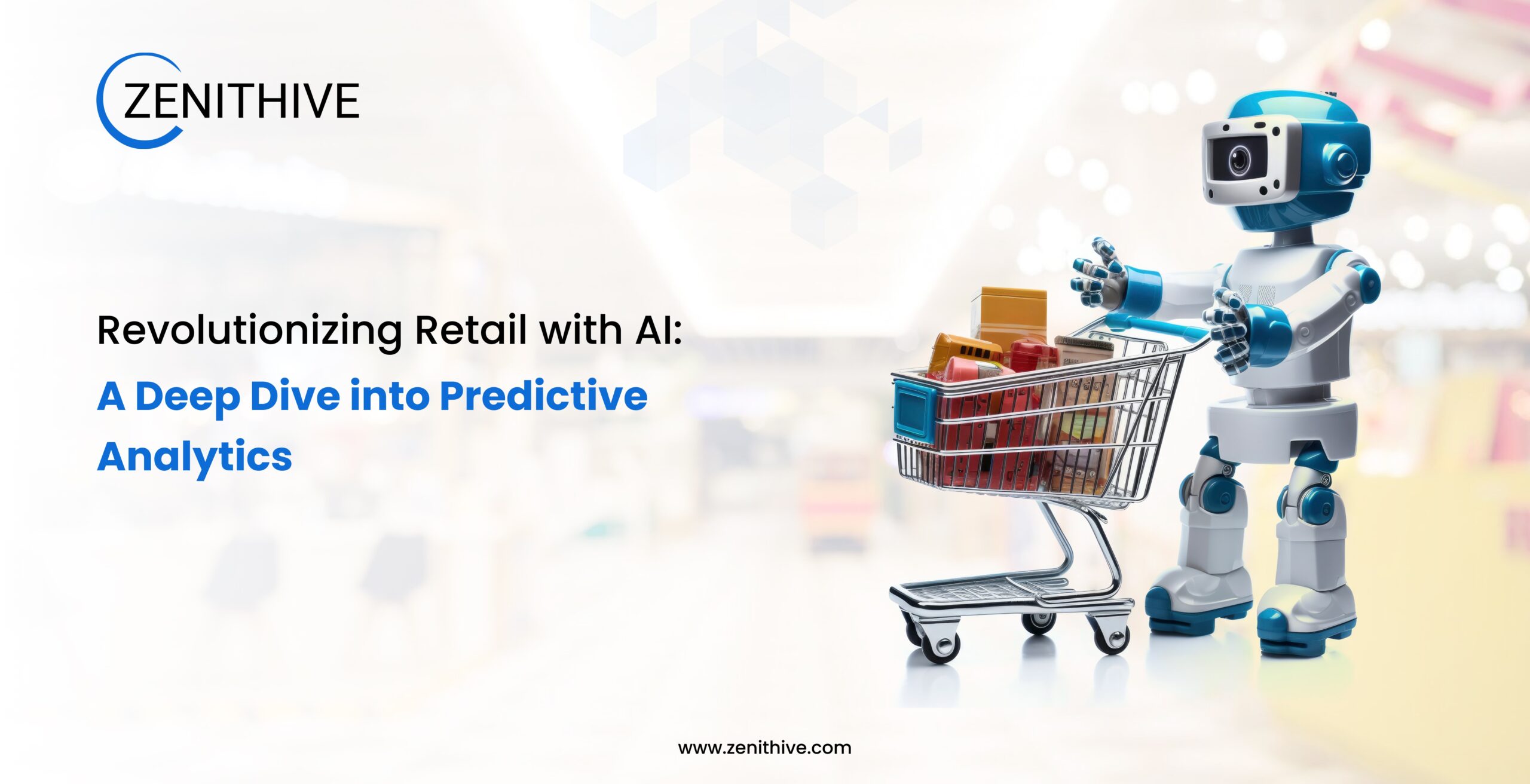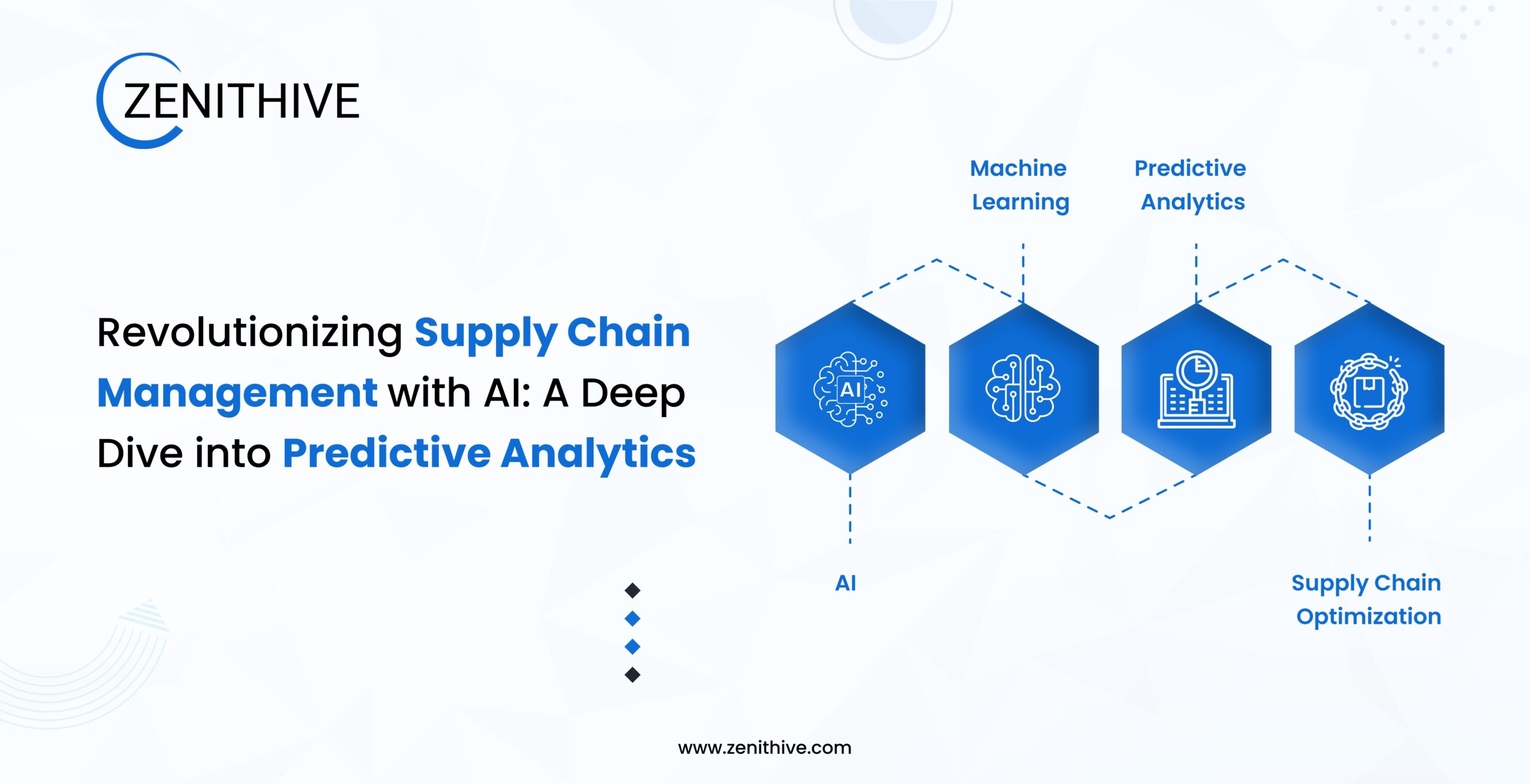Revolutionizing Retail with AI: A Deep Dive into Predictive Analytics

Introduction
Retail is evolving at an unprecedented pace, driven by technological innovations that are reshaping customer expectations and operational models. At the heart of this transformation lies artificial intelligence (AI), a powerful force unlocking the potential of predictive analytics to address long-standing challenges in the sector.
Predictive analytics has become a cornerstone for modern retail strategies, enabling businesses to anticipate customer needs, optimize operations, and stay competitive in a dynamic market. For instance, global spending on retail AI solutions is forecasted to reach $19.9 billion by 2027, growing at a compound annual growth rate (CAGR) of 34.4%. As a trusted partner, Zenithive, a leading Data Science Service Company and AI Solution Company, is empowering retailers to navigate this shift effectively.
Modern Retail Challenges and the Need for AI
Retailers today face several challenges that impede growth and customer satisfaction:
- Inventory Inefficiencies: Poor stock management leads to overstocking or stockouts, costing retailers approximately $1.75 trillion annually worldwide.
- Consumer Behavior Volatility: Rapidly changing preferences and shopping habits require businesses to adapt quickly.
- Intense Competition: Retailers must innovate constantly to maintain a competitive edge.
AI is uniquely positioned to address these issues by using real-time data, machine learning algorithms, and advanced analytics.
According to McKinsey, AI technologies could generate up to $800 billion in value annually for retail operations worldwide. With 85% of retail companies now investing in AI solutions, the industry faces unprecedented opportunities for growth and innovation.
Predictive Analytics: The Foundation of AI in Retail
Predictive analytics uses historical data, machine learning, and statistical algorithms to forecast future trends. In retail, it serves as a strategic tool to enable proactive decision-making.
Key applications include:
- Demand Forecasting: AI-powered predictive models analyze past sales data, seasonal trends, and external factors to optimize inventory planning. Retail giants like Walmart use such systems to reduce stockouts and improve inventory turnover by 15%.
- Customer Segmentation: Advanced algorithms group customers based on purchasing behavior, enabling targeted marketing campaigns that resonate with specific audience segments.
- Dynamic Pricing Models: Retailers like Amazon employ AI to adjust prices in real-time, ensuring competitiveness while maximizing profitability.
Additionally, major retailers have seen tangible results:
- Target reduced forecast errors by 30% through machine learning in inventory management.
- Walmart decreased customer wait times by 50% with AI-powered scheduling.
- North Face achieved a 60% improvement in product search relevancy using AI personalization.
These capabilities not only improve operational efficiency but also create tailored customer experiences that drive loyalty.
AI and Enhanced Customer Experience
AI has revolutionized how retailers engage with customers, creating personalized experiences that meet individual needs. By analyzing purchase history, browsing behavior, and preferences, AI solutions can:
- Provide Tailored Recommendations: Platforms like Netflix and Amazon use recommendation engines to suggest products, significantly boosting conversion rates. Sephora’s AI-driven product recommendations increased conversion rates by 30%.
- Enhance In-Store Interactions: Sephora’s AI-powered virtual assistants guide customers through product selection, increasing satisfaction and retention.
Research by Deloitte shows that retailers using advanced analytics report a 15-20% increase in sales revenue, a 30% reduction in inventory costs, and a 45% improvement in customer satisfaction scores. By collaborating with an AI Solution Company, businesses can harness this potential without overwhelming internal resources.
Operational Efficiency Powered by AI
Beyond customer experience, AI is transforming the backbone of retail operations:
- Smart Supply Chains: AI optimizes logistics by predicting demand, identifying bottlenecks, and reducing waste. For example, Unilever’s AI initiatives improved forecasting accuracy by 30%, minimizing supply chain disruptions.
- Automated Store Operations: Cashier-less stores like Amazon Go utilize AI for real-time inventory tracking, reducing labor costs while enhancing convenience.
- Predictive Shipping Models: Amazon’s predictive shipping anticipates orders before they are placed, reducing delivery times by up to 75%.
These efficiencies translate into significant cost savings and operational agility, helping retailers respond to market demands effectively.
Zara’s AI implementation offers a compelling example:
- $2.3 billion cost savings in inventory management
- 20% reduction in stock requirements
- 60% faster product development cycles
Similarly, Kroger’s smart shelf technology delivered:
- 95% improvement in inventory accuracy
- 25% reduction in out-of-stock items
- $250 million annual savings in labor costs
Challenges and Solutions in AI Adoption
While AI offers immense potential, its implementation comes with challenges:
- High Upfront Costs: Deploying advanced AI systems can be expensive for small and mid-sized retailers.
- Data Privacy Concerns: Ensuring compliance with regulations like GDPR is critical to maintaining customer trust.
- Skill Gaps: The lack of in-house expertise in AI and data science can hinder adoption.
Partnering with a reliable Data Science Service Company like Zenithive mitigates these challenges by offering scalable, cost-effective solutions tailored to individual business needs. Our team provides end-to-end support, from data integration to model deployment.
The Future of Retail with AI
AI’s role in retail continues to expand, with exciting trends on the horizon:
- Immersive Shopping Experiences: Virtual reality (VR) powered by AI offers interactive environments where customers can try products virtually before purchase.
- Prescriptive Analytics: Advancing beyond prediction, AI will soon enable real-time decision-making to recommend actionable steps for retailers.
The global retail AI market shows strong growth trajectories. Research by Gartner predicts it will reach $19.9 billion by 2027. These developments signify a future where physical and digital retail seamlessly converge, driven by innovative AI applications. By working with an experienced AI Solution Company, retailers can stay ahead of these trends and remain competitive.
Conclusion
Retail is at a crossroads, and the right AI solutions can make all the difference. Zenithive, a leading Data Science Service Company, specializes in empowering retailers with cutting-edge AI-driven insights and strategies.
Schedule a consultation today to explore how our solutions can transform your business into a leader in the modern retail era.


